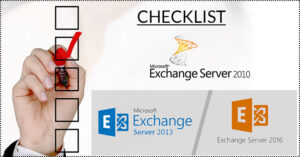The Exchange Recovery Manager is a tool that can carry Exchange database recovery, repair broken or inaccessible EDB files and relocate them to the desired location. It can also migrate/ export to Exchange and Office 365 very proficiently. Additionally, the user can choose to migrate either the entire mailbox or selected items upon their need.
What makes the Exchange Recovery Manager a unique tool for Exchange database recovery
Whatever be the task related to Exchange database recovery, the Exchange Recovery Manager handles it all with expert detail. It can rescue corrupt or inaccessible EDB files, recover entire mailboxes from corrupt information stores/ Live Exchange servers. Apart from this, it can also add Exchange server, Outlook profile, and Office 365 as a source. The tool can export added source EDB files and source mailboxes to Outlook PST, Exchange Server, Office 365, and Outlook profile stores. This facility is valid for both – public folder and the archive mailbox. The source mailbox items can export to file formats like RTF, HTML, EML, MSG, etc.
A look into the specialties of Exchange database recovery tool by Shoviv
Adds Live Exchange mailboxes and Office 365 as a source
This Exchange database recovery tool can add Exchange server mailboxes through the Active Directory via the Windows user credentials. Having the full admin rights over the added credentials, one can add other mailboxes too. The delegation rights let the user export the added mailboxes to another target mailbox like Live Exchange, Office 365 along with the facility to export in PST format.
Easy recovery of added Exchange EDB files
With this Exchange database recovery tool, you can also instantly recover added Exchange EDB files. In the process of Exchange database recovery this tool can recover corrupt and non-corrupt EDB files- both private and public. In the process, it also keeps intact such credentials as folder hierarchy, emails, contacts, calendars, notes, journals, etc. from the EDB files which undergo recovery. Also, the Exchange database recovery via this tool is guaranteed to cause zero damage to data integrity.
Capable of adding public folder as well as archive mailbox
Using this feature of the Exchange database recovery tool users can add Live Exchange/ Office 365 public folder/ archive mailbox and export it to another Live Exchange/ Office 365 public folder. All of this is quite convenient and free of complications. Also, the interface designed to serve all kinds of users let them add Outlook stores with the option to select Outlook with proper folder hierarchy maintenance. The Outlook stores can also migrate to PST, Live Exchange, and Office 365.
Preview option which lets the users’ preview source mailbox items
To ensure that the users have an easy time in Exchange database recovery, this tool allows the preview option too. This facility lets the users preview source mailbox items before exporting the source mailboxes into PST, Live Exchange, and Office 365. This feature is particularly useful for to cross-check the source mailbox items and to ensure the accuracy and integrity of the product. The MAPI tag allows the users to preview items.
Export in Live Exchange, Office 365, and Outlook profiles
The automatic and manual mapping method lets the users carry Exchange database recovery in a more convenient manner. The users can export the added source mailboxes to Live Exchange, Office 365, and Outlook profile stores. The option to migrate specific date range items and select message class to source mailbox are available. With maintained data integrity it exports added source mailbox to target mailbox.
Converts the EDB files to the popular PST format
Exchange database recovery is more proficient as it allows PST conversion via this software. The tool would let you extract and convert a select mailbox to new and existing PST files. The restored EDB files too can be converted to new PST files. In addition to this, one can also import/ export mailbox items and transfer emails, contacts, calendars, and other items between the Live Exchange server, Office 365, and Outlook profile.
Facility to split PST files
To make sure that the Exchange database recovery process goes according to the convenience of the user, this tool provides PST split option too. Using this feature one can split the data into as many PST files as they want. By default, the software creates one PST file for one mailbox.
EDB restore facility
This Exchange recovery tool is known for recovering corrupt data files from Office 365, Live Exchange, PST, EML, MSG, HTML, and RTF. One can also add large EDB files without any file size restriction.
Items search and filter option
The facility of data search and filter has been added for the sheer comfort in the entire Exchange database recovery. The user can benefit from the items’ search facility to search for mailboxes using various criteria. The criteria are for faster search are CC, BCC, From, Attachment name, read/ unread messages, item type, etc. The filter option, on the other hand, helps one to include/ exclude items. The filter option can also be used to add a new message class as per user requirement.
Saves source mailbox items into various file formats
This tool would not only carry Exchange database recovery but provide an array of options for the target mailbox too. The source mailbox items can save into various file formats including HTML, EML, MSG UNICODE, CAL, RTF, VCard, etc.
Exports and saves report status in HTML format
Once the process of Exchange database recovery completes, the user can save the resultant mailboxes into different formats. The HTML format is also provided which is quite useful in maintaining tidy data storage.
Use this tool for Exchange database recovery today and enjoy all these fascinating features instantly. The link to download the tool is below.
To try the free demo version of the tool you can click right here.
- How to Backup and Restore Emails in Webmail? - March 25, 2025
- How to Migrate Outlook to New Computer? - February 15, 2025
- Fix If Outlook Cannot Display the Specific Folder Location - February 1, 2025



